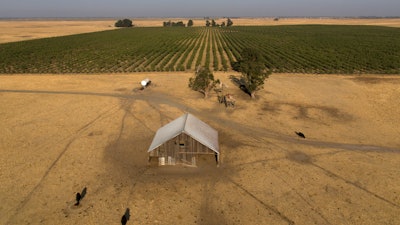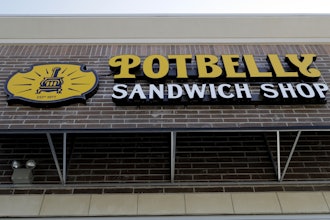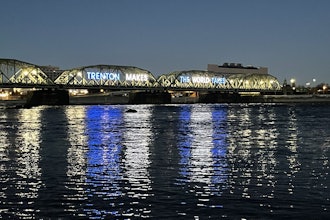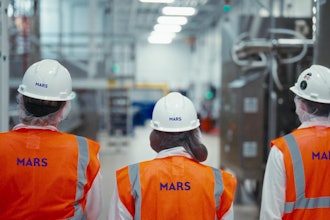
RIO VISTA, Calif. (AP) — After years of secretly snapping up farmland for a new city northeast of San Francisco, the CEO of a company backed by Silicon Valley billionaires pitched voters Wednesday on his vision for a walkable, affordable community that would appeal to their California pride.
Jan Sramek, a former Goldman Sachs trader spearheading the ambitious city-building effort, offered the first detailed look Wednesday at his proposal to construct least 20,000 homes in rural Solano County, between Sacramento and the San Francisco Bay Area.
His plan needs the approval of county voters in November to bypass protections put in place in 1984 to keep agricultural land from being turned into urban space. If approved, it would be built on more than $800 million of rural land Sramek and his company, California Forever, stealthily purchased over a period of years to the great suspicion of locals.
He said the development could be "an amazing success story" in a state in need of a win at a time when leaders of Texas and Florida are routinely beating up California, something he said was unimaginable 50 years ago when all anyone could talk about was the "California Dream."
"California used to be this place of optimism," said Sramek, who was born in the Czech Republic and now lives in Solano County. "And if this project is done right, I do think it's going to change the conversation. It's going to open up a new path for the state and for the region."
The state is in desperate need of more housing, especially homes affordable for teachers, firefighters and other municipal employees that make a community run. Project proponents say Solano County is the ideal place to build, and the location near Travis Air Force Base would appeal to military contractors.
But critics, including a congressman and environmental groups such as the Sierra Club, remain skeptical about the project's aims, especially after Sramek's company spent years secretly buying up land around the base and even suing local farmers who refused to sell. They say more urban sprawl could harm sensitive ecosystems and tax the region's already strained water supply.
"Buying up farmland at low prices and rezoning for housing development has been a quick way to make a buck for decades in California," the Solano Farm Bureau said in a statement released by Solano Together, a coalition that opposes the initiative.
The company's newly revealed 83-page initiative, submitted to county elections on Wednesday, next requires a ballot title and summary from the county before the campaign can begin collecting signatures. They need signatures from roughly 13,000 county voters to place the measure before voters in November.
It could lead to a costly ballot fight by local standards, given the deep pockets of his project's backers — philanthropist Laurene Powell Jobs, LinkedIn co-founder Reid Hoffman, venture capitalist Marc Andreessen and others. It's unclear if the opposition is poised to raise significant cash.
Sramek's presentation before media and supporters inside a veterans memorial building in the tiny city of Rio Vista, which would sit near the new community's eastern edge, outlined his plan for 50,000 residents living in rowhouses and apartment buildings between three and six stories high within walking distance to jobs, schools, bars, restaurants and grocery stores.
Eventually, the city could grow to 400,000 people, the group says, but only if it can create at least 15,000 jobs that pay above-average wages. The plan calls for an initial $400 million to help Solano County residents and air force base families buy homes in the proposed community, among other investments. The money could also go toward new affordable housing for seniors, veterans and farm workers.
Veteran Democratic consultant Bill Carrick said the group faces a tough challenge winning over local residents at a time of high voter cynicism, hostility between political parties and inevitable doubts about wealthy outsiders coming into the community.
"People are wary of the unknown," Carrick said. The proponents "have to make Solano County voters believe this is better for them than the current status quo. People are suspicious about ballot measures – otherwise, more of them would pass."
Carrick guessed it could cost at least $10 million although Sramek declined to state how much he is prepared to spend. He said the campaign was not about money, but about tapping into a genuine desire from local officials and residents to build a sustainable community.
"I'm going to make this happen no matter what," he told reporters after the presentation.
Created in 2017, California Forever has purchased more than 78 square miles (202 square kilometers) of farmland in Solano County. Sramek pitched his vision at town halls around the county last month, but has been unable to quiet skeptical critics.
Critics of the project held signs outside the building Wednesday, indicating they had been shut out. They spoke to reporters about their fears that Solano County does not have the roads and other infrastructure to accommodate growth.
"I do feel that they're marketing to the younger generation, and they're throwing out a bunch of financial incentives to make it look bright and shiny to those people," said Rio Vista resident Roxanne Stiles-Donnelly, who is retired from nursing.
But inside, artist and musician Radhika Lynette said she loves the passion behind the project. The Vallejo resident left San Francisco 17 years ago in search of cheaper rent and Victorians.
"Who hasn't dreamed of a place where it's more sustainable? We're kind of behind on that in America, I feel like. The walkable element is really a big deal," she said.
Sramek said he decided to build from scratch because the needs are too great to simply build within existing cities, as some critics have suggested. He said construction costs are too high to make affordable housing work and there's not enough land to meet the demand for jobs and homes.






















